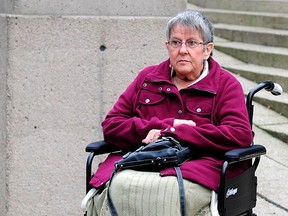The B.C. Civil Liberties Association is ‘aware of concerning reports of people being offered MAID in circumstances that may not legally qualify’

Article content
The civil liberties group that led the push for the 2015 decriminalization of physician-assisted suicide in Canada is now warning it has become too easy to obtain MAID, and the government must enact safeguards.
The British Columbia Civil Liberties Association (BCCLA) filed the case for Carter v. Canada, the constitutional challenge that led to the country’s current Medical Assistance in Dying (MAID) regime. Statistics released last week reveal it was responsible for about one in 20 deaths in Canada in 2023, including 622 people who received MAID for a non-terminal illness.
Advertisement 2
Article content
Liz Hughes, who has served as BCCLA executive director since June 2023, said in a statement to the National Post the group is “aware of concerning reports of people being offered MAID in circumstances that may not legally qualify, as well as people accessing MAID as a result of intolerable social circumstances.”
Hughes called for government action: “Governments must put in place, actively review, and enforce appropriate safeguards to ensure that people are making this decision freely.”
The BCCLA’s work around MAID has evolved, Hughes said, and the organization “will continue to hold the government accountable.”
In April 2011, the civil liberties group filed the lawsuit that led to the 2012 Taylor decision that decriminalized euthanasia in British Columbia and led to federal MAID legislation.
The BCCLA’s statement reflects longer standing concerns at the group.
In a video shared with the National Post by disability activists, a BCCLA litigation staff lawyer told a Zoom town hall on Sept. 27, 2023, that her work with the association “may very well involve adopting either a modified or a new policy around our position on MAID in light of the fact of, you know, that it’s being abused.”
Article content
Advertisement 3
Article content
She said she is “very uncomfortable with our previous work around MAID,” and said staff want to be “making sure people have adequate supports and access to health care and other financial resources.”
Another BCCLA staff member told the town hall “we’ve done an environmental scan, so that was a kind of review of what’s currently happening with MAID in Canada, and it’s very concerning … the whole coercive dynamic that’s inherent with, you know, disabled people and their health-care providers.”
Recommended from Editorial
She said she and other staff members had submitted recommendations to the BCCLA board recommending a new policy around MAID.
Of particular alarm to the staff members were reports of MAID being used in prisons while incarcerated people were shackled to their beds, the program’s lack of legal oversight, disproportionate representation of impoverished people receiving assisted suicide, and health-care practitioners offering assisted suicide when patients asked for support for living.
Advertisement 4
Article content
Hughes’ statement emphasized that “the BCCLA stands by our work to make the right to choose MAID a reality in Canada” as it is important for “choice, agency and bodily autonomy,” but called the reports of intolerable social circumstances driving MAID deaths “unacceptable.”
Part of the BCCLA’s work to “hold governments accountable as our work on MAID evolves,” involves ensuring there are “adequate social supports so that people are able to lead dignified lives,” Hughes said.
In an interview, disability activist Roger Foley said it is significant that these comments come from the civil liberties group that spearheaded the inception of Canada’s MAID program: “BCCLA was the driving force and creator of the legal challenge that decriminalized euthanasia and assisted suicide in Canada,” Foley said.
Health Canada’s Fifth Annual Report on Medical Assistance in Dying in Canada last week revealed that over 15,300 Canadians died by MAID in 2023, representing a 15.8 per cent increase in deaths from the previous year. In 2023, MAID accounted for 4.7 per cent of deaths in Canada.
Advertisement 5
Article content
Quebec accounted for 36.5 per cent of all Canadian MAID deaths in 2023. Quebec’s 5,601 MAID deaths represented 7.2 per cent of the province’s total deaths — about one in every 14. B.C. is not far behind; MAID now represents 6.1 per cent of all deaths in that province.
As recently as 2018, Health Canada estimated MAID provisions wouldn’t exceed 2.05 per cent of total deaths — a ratio that has now more than doubled.
Health Canada’s report reveals that 47.1 per cent of non-terminally ill Canadians who applied for MAID reported “isolation or loneliness” as one of the causes of their suffering. Just under half of all Canadian MAID cases (terminal and non-terminal) indicate that they want an early death in part lest they become a “perceived burden on family, friends or caregivers.”
In 2023, the median age of successful assisted suicide applicants was 77.7 years.
Our website is the place for the latest breaking news, exclusive scoops, longreads and provocative commentary. Please bookmark nationalpost.com and sign up for our newsletters here.
Article content







